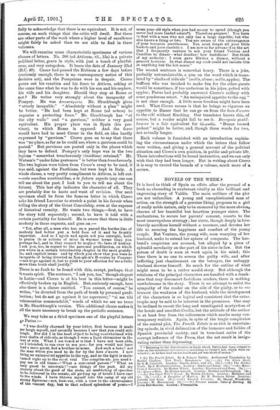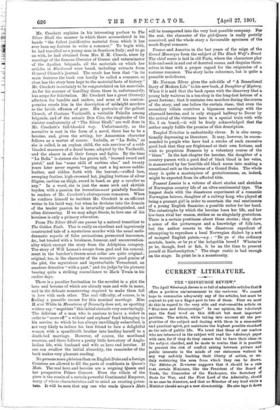NOVELS OF THE WEEK4 IT is hard to think of
Spain as effete after the perusal of a book so abounding in exuberant vitality as this brilliant and engrossing story of Valdes. The main outlines of the plot are not unfamiliar. A young and unsophisticated man of action, on the strength of a genuine liking, proposes to a girl of really noble nature, only to be ensnared by the more obvious charms of her beautiful but heartless younger sister. The enchantress, to secure her parents' consent, resorts to the most unscrupulous strategy ; her sister, though deeply in love, bravely sacrifices herself without a murmur, and devotee her life to securing the happiness and comfort of the young couple. But Ventura, the young wife, soon wearying of her husband, seeks to extend her sphere of conquests. The hus- band's suspicions are aroused, but allayed by a piece of splendid mendacity on the part of his sister-in-law. But the poison of doubt is soon at work again in his mind; this time there is no one to screen the guilty wife, and after inflicting just chastisement on the betrayer, the unhappy husband drowns himself. So much for the outline of what might seem to be a rather sordid story. But although the relations of the principal characters are handled with a frank- ness that may disconcert fastidious readers, there is nothing unwholesome in the story. There is no attempt to enlist the sympathy of the reader on the side of the guilty, or to ex- tenuate the weakness of the husband, while the development of the characters is so logical and consistent that the catas. trophe may be said to be inherent in the premisses. One may be inclined to resent the long and unmitigated martyrdom of the heroic and unselfish Cecilia, but the attitude of the author is at least free from the callousness which marks many con- temporary realists. Again, in spite of the tragic complexion of the central plot, The Fourth Estate is so rich in entertain- ing episode, in vivid delineation of the humours and foibles of Spanish provincial society, and in trenchant satire of the corrupt influence of the Press, that the net result is invigo- rating rather than depressing.
•
"Referring to the foreclosures on lands which Ptetus had been obliged to take on the valuations (zstimationes) according to Ciesar's law, which were on- saleable; so he had laud on his hands and yet was short of money."
t (1.) The Fourth Estate. By A. Palacio Valdds. Authorised Translation by Rachel Chalice. New York : Brentano's. [6s.]—(2.) The Silver Shull. By s. B. Crockett. London : Smith, Elder, and Co. [66.]—. The Oolden Tooth. By J. Maclaren Cobban. Loudon Digby and Long. Ns. —(4.) Moun- tains of Necestrity. By Hester White. Loudon Blackwood and Sons. ps.1—; (5.) Queen's Mate. By Morice Gerard. London Hodder and Stoughton. [68.] The Black Wolf's Breed. By Harris Dickson. London: Methuen and Co. [Bs.]—(7.) 4 Daughter of Mystery. By B. Norman Silver. London: Jerrold and Sons. (5s.J—(8.) Tangled Trinities. By Daniel Woodrode. London: W. Heinemann. [6s.]—(9.) Peasant Lassies: Tales of Norway. By JuttaBellatenake. London: Freementle.
Mr. Crockett explains in his interesting preface to The Silver Skull the manner in which there accumulated in his hands "the fullest justificative material from which it has ever been my fortune to write a romance." To begin with, he had travelled as a young man in Southern Italy; and to go on with, he had obtained from Mrs. E. M. Church, niece by marriage of the famous liberator of Greece and exterminator of the Apulian brigands, all the materials on which her articles in Blackwood were based, including extracts from General Church's journal. The result has been that "in its main features the book can hardly be called a romance, so close has the story been kept to the material facts of history.' Mr. Crockett is certainly to be congratulated on his materials. As for his manner of handling them, there is, unfortunately, less scope for felicitation. Mr. Crockett has a great (literary) affection for bandits and raiders, and none of his contem- poraries excels him in the description of midnight murders or the lavish effusion of gore. His portraits of the gallant Church, of Gaetano Vardarelli, a veritable Paladin among brigands, and of the satanic Don Ciro, the ringleader of the sinister confraternity of "The Silver Skull," are well done in Mr. Crockett's full-blooded way. Unfortunately, as the narrative is cast in the form of a novel, there has to be a heroine, and, given the setting, her Amazonian character follows as a matter of course. Isabella, or "La Bella," as she is called, is an orphan child, the sole survivor of a cold- blooded massacre of a ducal house, adopted by the Vardarelli, and the sharer in all their forays and fights. By the time " La Bella" is sixteen she has grown tall, "learned sword and pistol," and has "some skill of carbine also," and twenty years later never regrets "having cast a leg across saddle- leather, and ridden forth with the bravest,—ruffied lace, sweeping feather, high-crowned hat, jingling buttons of silver filigree, carbine on thigh, sword in hand, as gay a cavalier as any." In a word, she is just the same arch and skittish hoyden with a passion for travestissement painfully familiar to readers of Mr. Crockett's obstreperous romances. When he confines himself to incident Mr. Crockett is an efficient writer in his lurid way, but when he deviates into the domain of the tender passion he is invariably undistinguished, and often distressing. If we may adapt Steele, to love one of his heroines is only a primary education.
From The Silver Skull one passes by a natural transition to The Golden Tooth. This is really an excellent and ingeniously constructed tale of a mysterious murder with the usual melo- dramatic seguelw of false accusations, persecuted innocence, ttc., but treated with a briskness, humour, and unconvention- ality which exempt the story from the Adelphian category. The story of Will Lomas's escape from gaol and his conceal. ment in the butcher's frozen-meat cellar are quite original ; original, too, is the character of the eccentric good genius of the plot, the mysterious and inperturbable Townshend, an amateur detective "with a past," and (to judge by his picture) bearing quite a striking resemblance to Mark Twain in his earlier days.
There is a peculiar fascination to the novelist in a plot the hero and heroine of which are already man and wife in name, and in the delicate manceuvring required to make them fall in love with each other. The real difficulty, of course, is in finding a passable excuse for this nominal marriage. Miss Hi ster White in Mountains of Necessity does not, as sporting writers say, " negotiate" this initial obstacle very convincingly. The delirium of a man who is anxious to leave a widow in order to" score off" a widows' and orphans' fund belonging to his service, to which he has always unwillingly subscribed, is not very likely to induce his best friend to lure a delightful woman with a spendthrift brother into lending herself to a death-bed marriage. However, of course, the moribund recovers, and there follows a pretty little love-story of Anglo- Indian life, with husband and wife as hero and heroine. If one can swallow the initial absurdity, the remainder of the book makes very pleasant reading.
No persons more plebeian than an English Duke and a foreign Countess are allowed to fill the parts of confidants in Queen's Mate. The real hero and heroine are a reigning Queen and her prospective Prince Consort. Even the villain of the piece is the cousin of a certain powerful Continental Emperor, many of whose characteristics call to mind an existing poten- tate. It will be seen that any one who reads Queen's Mate will be transported into the very best possible company. For the rest, the character of the girl-Queen is really prettily conceived, and the whole story a favourable specimen of the mock-Royal romance.
France and America in the last years of the reign of the Grand Monargue form the subject of The Black Wolf's Breed. The chief scene is laid in old Paris, where the characters play hide-and-seek in and out of deserted rooms, and disguise them- selves in inns with a proper regard for the exigencies of a costume romance. The story lacks coherence, but is quite a passable melodrama.
Mr. Norman Silver gives the sub-title of "A Sensational Story of Modern Life" to his new book, A Daughter of Mystery. When it is said that the book opens with the discovery that a young lady waitress in a tea-shop is the long-lost heiress of a great fortune ; that it contains two murders during the course of the story, and one before the curtain rises; that even the secondary villain contrives a bigamous marriage with the aforesaid heroine, and is only stopped halfway to Dover by the arrival of the virtuous hero in a special train with wife No. 1 on board,—it will be freely acknowledged that the author amply fulfils the promise of this description.
Tangled Trinities is undoubtedly clever. It is also excep. tionally depressing as literature. It may, however, be recom- mended to people who have had a stroke of such excessive good luck that they are frightened at their own fortune, and wish to propitiate Nemesis by a voluntary course of the "blues." In the last chapter the heroine, the daughter of a country parson with a good deal of black blood in her veins, is manceuvred by her horrible old black nurse into making a sensational exit as the mistress of a Grand Duke. The whole story is quite a masterpiece of gratuitousness, as, indeed, might be expected from its affected title.
Peasant Lassies is a volume of short stories and sketches of Norwegian country life of an ultra-sentimental type. The longest deals with the disastrous experiment of a romantic, Norwegian heiress, daughter of a railway king, who played at being a peasant girl in order to ascertain the real sentiments of a young English financier, a possible suitor for her hand. The catastrophe by which the heroine loses her life, and her low-born rival her reason, strikes us as singularly gratuitous. There is a certain prettiness about these stories ; they show a sense of the picturesque and a knowledge of folk-lore, but the author resorts to the disastrous expedient of attempting to reproduce a local Norwegian dialect by a sort of mongrel English patois,—e.g. : "Be ye o' the ordinary mortals, lassie, or be ye o' the hobgoblin breed ? Whatso'er ye be, though, fowl or fish, it be na the time to present yerself at Enehoerhytten." The stage rustic is bad enough on the stage. In print he is a monstrosity.























































 Previous page
Previous page